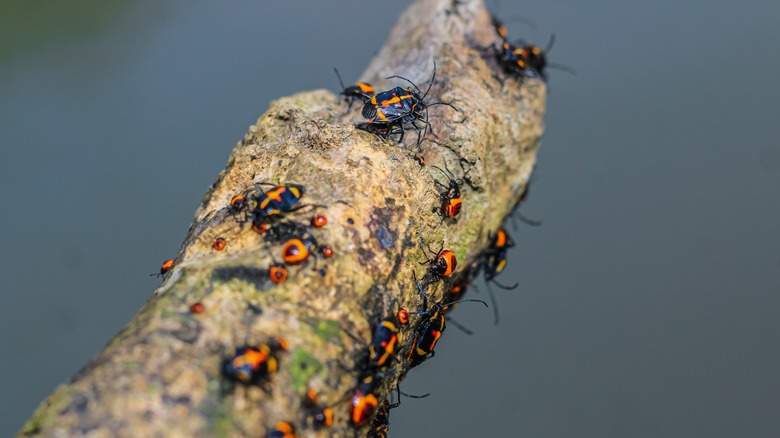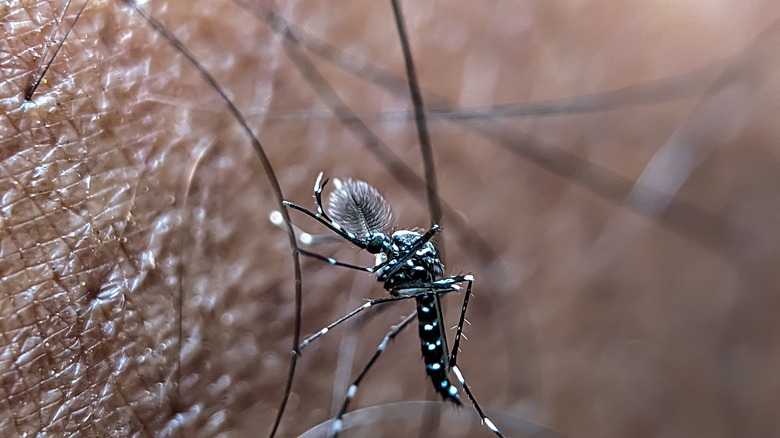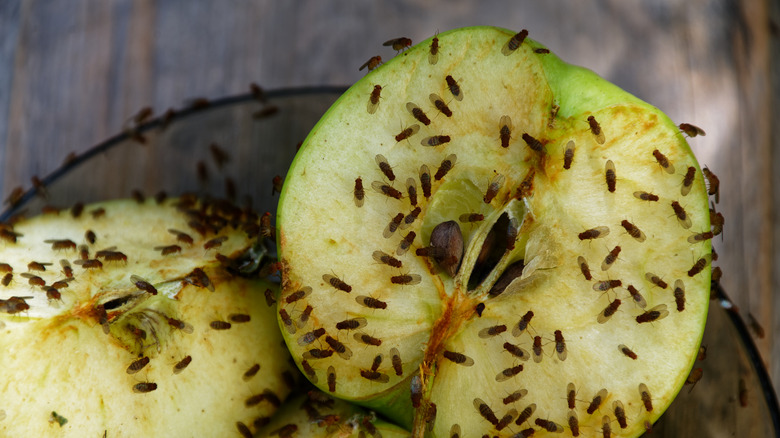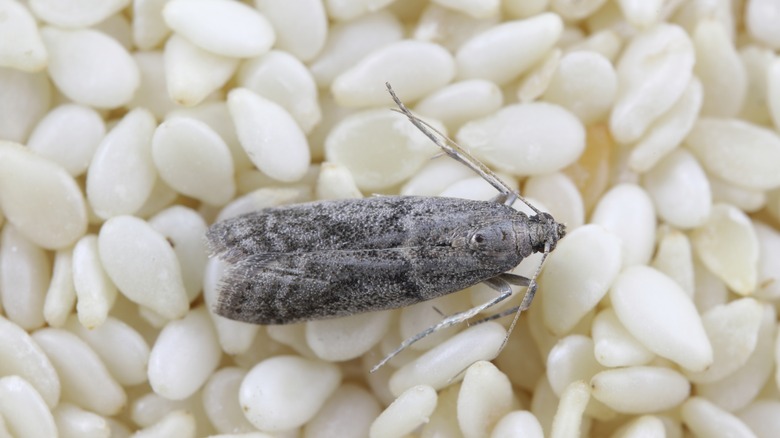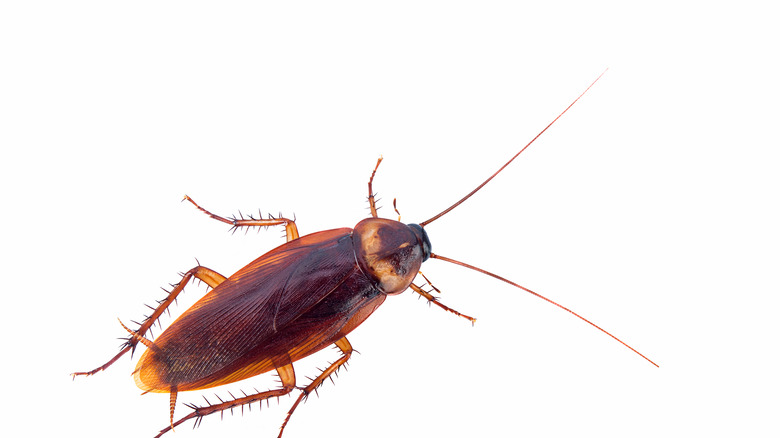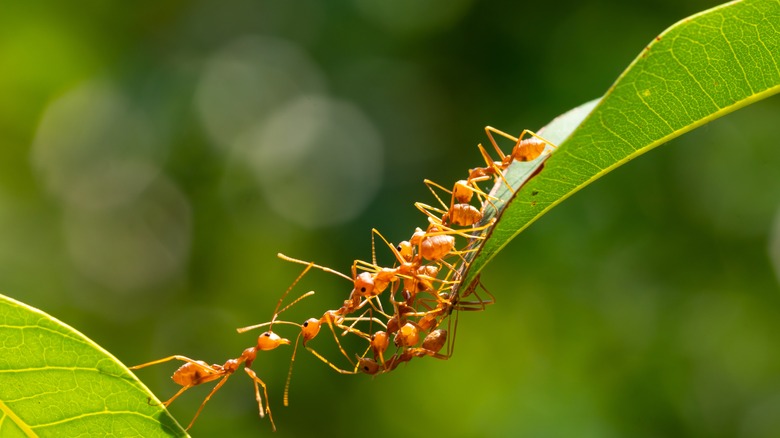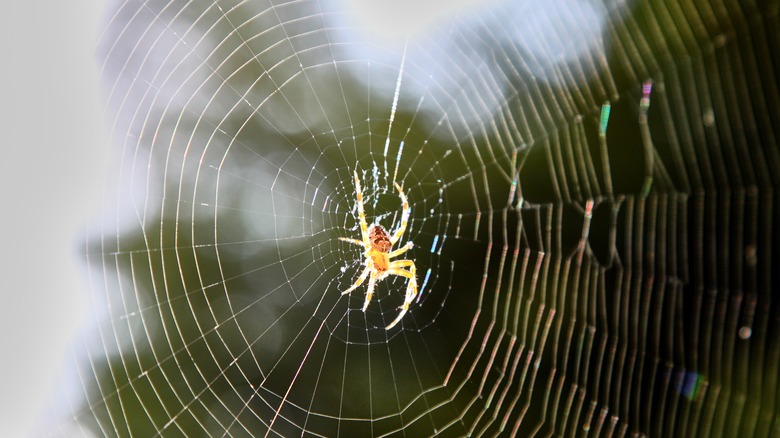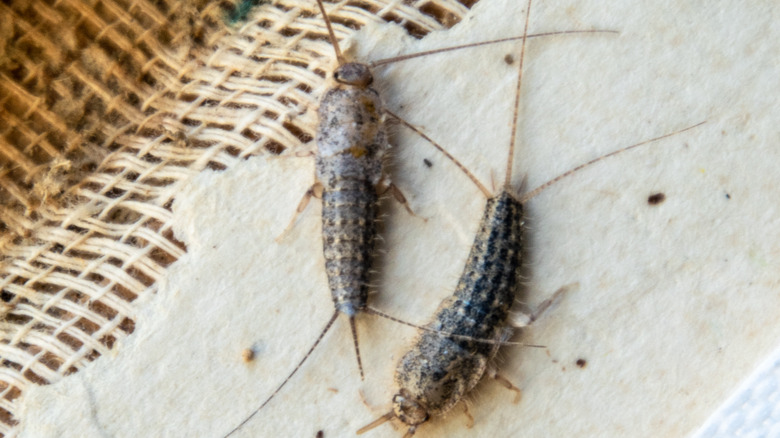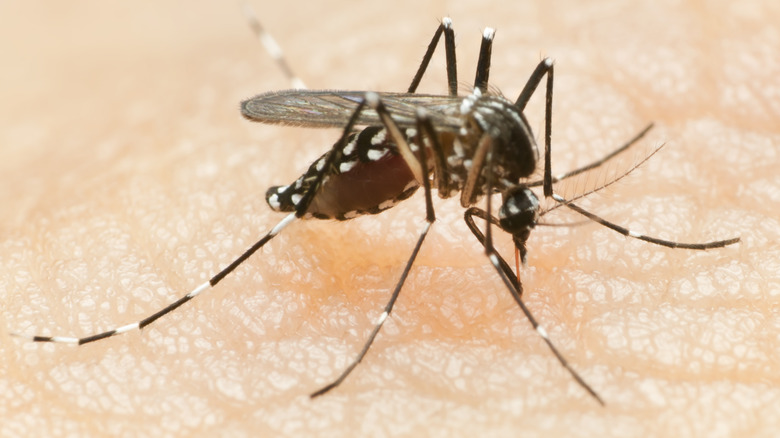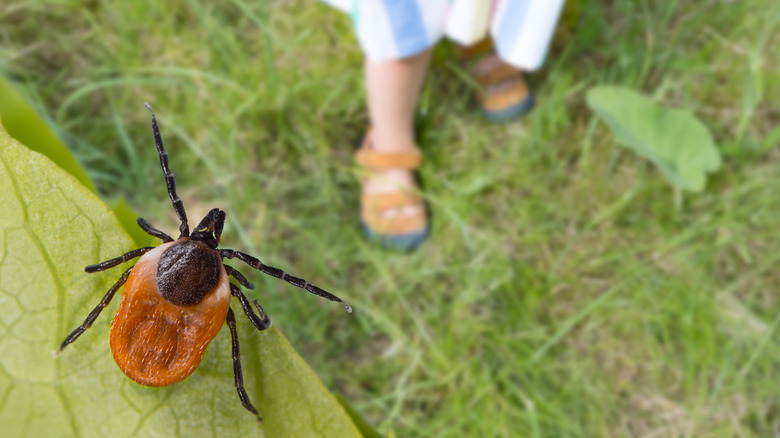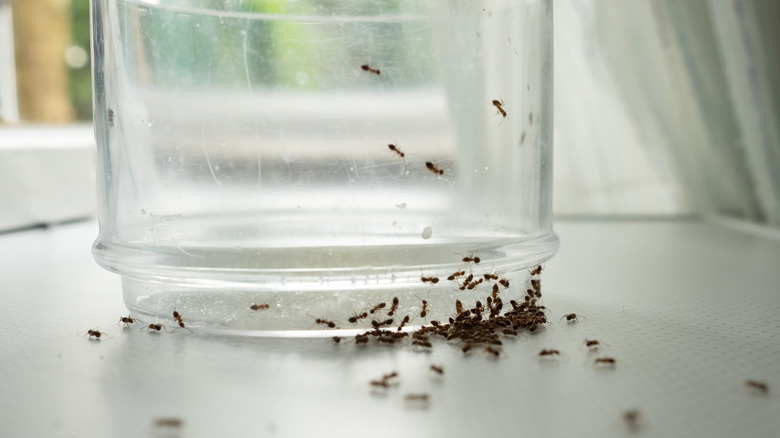How To Repel Bugs Naturally
We may receive a commission on purchases made from links.
Oh, how bugs bug! They ruin the atmosphere with flickering wings and beady little eyes. They move in and make themselves right at home. You know the story: a fly rubs his skinny legs together and lands on your morning casserole. Or a sneaky spider spins his web down your new lampshade. These bugs always seem to be around, don't they? Who can forget that one infuriating mosquito that ruined your party? What about the swarm of ants that appear like little soldiers in a procession line on your kitchen counter? They are plenty bugs you don't want living in your home.
It can seem like an unbeatable battle with these unrelenting bugs. Until now! It turns out there are plenty of ways to repel these pests naturally. Of course, there are also traditional lotions and sprays available. However, these often come packed with toxic chemicals. But first things first: Ortho reports that a home should always be clean and wiped down to avoid attracting bugs in the first place. That means we should put away the takeout and ensure there aren't any crumbs on the counters. Sealing up cracks and openings is also essential in the fight against pests. Just like us, bugs look for water, food, and shelter. Now, let's take a closer look at how to evict these buggers.
Mosquitos don't appreciate lavender
Mosquitos are like little demons with a penchant for sucking blood. Where did these buzzing mini-vampires come from anyway? However, there is hope beyond applying harsh chemicals to the body to keep them at bay. You can find a solution in a few different places. First off, according to KTVB on YouTube, these buggers don't like rosemary or basil. You can grow these herbs in your garden and watch their dominion diminish. Plus, the herbs will add a lovely touch to your yard.
Mosquitos also don't like lavender. According to Livspace, lighting a lavender candle will keep these buzzing pests away. Additionally, they repel from sliced lemons with cloves. So, leave some of these around the home and watch the mosquitos buzz away. They seemingly just don't like fragrances! Candles, oils, and incense are all enemies of mosquitos. They may hate the smell, but this is lucky for us since refreshing aromas are lovely. Get out the lemon, laurel, rosemary, basil, citronella, and lavender scents to evict these I-can't-stop-itching-my-skin bugs.
Flies hate cayenne pepper
Are you tired of batting the fly swapper all around the house? You can maintain a calm composure as you mix a formula that attracts them but results in their demise. It's like being a fly-killing mixologist! According to the Farmers' Almanac, a host of ingredients repel flies but let's hone in on one that they can't resist. Get some apple-scented liquid soap and put three tablespoons into a container without a lid. Then add a few inches of water. Flies love this mixture and will fall in it and drown.
There are other options if you'd rather not have dead flies in your home. Cayenne pepper helps keep flies out of your abode (via Healthline). Just get some cayenne pepper and mix it with water. Then spray the mixture throughout the home to prevent the flies from entering. Prefer not to use pepper spray in your house? Don't worry. There are always classic citronella candles that do the job as well. Light a few of them, and the flies will spend their month-long lifespan elsewhere.
Moths destroy our couture
Oh, moths. Not only do moths love to hide out in silk and cashmere, but they also ruin our favorite clothes. Have you ever taken out that beloved sweater from last season just to discover little holes are now decorating the arms? Did you know that the moth's eggs create those unsightly holes? Yes, they do! However, we can keep them away.
Moth Prevention reports that moths don't like cedar. They also don't appreciate lovely dried lavender in the closet. Make some dried lavender sachets and hang them inside your closet. You can do the same with cedar as well. Both will help repel moths and keep your clothes smelling fresh. Then there are pantry moths. Disgusting! First, ensure you don't have these gross moths taking over your pantry. Secondly, rub your pantry shelves with peppermint oil to keep them away. Most importantly, rest assured that peppermint oil is safe to use around food.
Roaches stay far away from spices
This one is a biggie! You know that roach crawling around at night you notice while sneaking downstairs for a midnight snack? Well, it's filthy and a priority to keep out of the house. There are quite a few DIY concoctions to repel these nasty insects. According to Bug House Pest Control, you can get an onion, cut up about a handful, and sprinkle baking soda on them. The onions attract the roaches, and the baking soda eliminates them. A win-win!
If you prefer not to have sliced onions decorating the home, you can make a concoction of tea tree and water instead. Simply mix ¾ of the tea tree with two cups of water. Then spray away. There's also the spice rack option of combining onion powder, cayenne, and garlic. Simply mix the spices and sprinkle them wherever cockroaches invade. They detest the smell and will stay far away from these spices.
Ants stay clear of vinegar, water, and lemon sprays
Ants. We have to hand it to them because they know how to stick together. They are determined little critters that will come out in earnest if one little speck of food is in the kitchen. They will pounce on sweet food items. They are also tiny enough to get into any openings. That's why you must cover up all of their entrances. Check for cracks in the walls and holes. If they're still forming colonies in your home, there are natural repellents to help manage them.
The Manual reports you can put out items that are natural ant deterrents found in most homes. Eliminate them with cinnamon, pepper, salt, curry powder, or chalk. Or, if you prefer a spray, try filling a spray bottle with the same amount of warm water, vinegar, and lemon juice. Shake up the ant-killing concoction and spray countertops, corners, floors, and other areas where they've created a trail.
It turns out lemons come in handy in other ways as well. Lemon or orange rinds in the soil of houseplants can help prevent an infestation (via Healthline). If you notice ants congregating around a plant, toss it out. It most likely has a swarm of them underneath the dirt.
Spiders run from essential oils
Spiders are creepy crawlies that make us cringe. We have to give credit where credit is due. Spiders help eliminate other bugs since they feast on mosquitos, flies, moths, and sometimes other spiders. Given there are pests we want to keep out of our home, we would do well to extend an appreciative nod to these eight-legged creatures. However, since we probably don't want them spinning webs in our homes, let's review how to keep spiders out of the picture.
Grove Collaborative reports that spiders dislike a host of essential oils, including rose, tea tree, lavender, eucalyptus, cinnamon, and peppermint. You can plant mint around the outside of the home to help keep them away. You can also choose from these essential oils by putting 20 drops of oil into the water in a handy spray bottle. Then simply spray the mixture around the home wherever you spot a spider. There's also the oh-so-traditional vinegar and water spray concoction. Mix equal parts water and vinegar in a spritzer and spray where you see spiders.
Another option to eliminate spiders is to put cedar blocks, balls, or chips wherever spiders hang out in your home. Finally, there's the garlic solution. For this concoction, you'll just need to mash up a few garlic cloves and let them marinate inside a spray bottle with water for a day. Then spritz it on the baseboards and corners of the home. Adios spiders!
Silverfish hate cucumber peels
Ever noticed a silverfish in the bathtub? It often makes its debut with skinny legs crawling around the bathtub as you gawk in terror. It turns out spiders eat them, but considering most of us don't want to wait for nature to perform its miracles, we can get rid of these critters naturally. Summit Environmental Solutions reports that you can peel a cucumber and put the cucumber peels wherever you spot silverfish. Just ensure you change out the peels until the critters are gone for good. Another option for eliminating silverfish is to put one whole clove wherever they congregate. It turns out cloves contain Eugenol, commonly utilized as an insecticide to eliminate bugs like silverfish.
Finally, you can surely get rid of silverfish by using cinnamon. Put cinnamon sticks in areas popular with silverfish, or make cinnamon sachets and place them in the same areas. Remember to put them inside drawers and cabinets. A bonus is they smell festive!
Mosquitos get confused by the scent of vanilla extract
To us, the scent of vanilla extract is pleasing and delicious; to mosquitos, it interferes with their ability to seek out what they're really looking for: blood meal. Vanilla extract acts as a deterrent by masking the scents of our sweat and natural body odors. The important factor to keep in mind when trying this for yourself is that you have to use pure extract; using an imitation extract could backfire due to the artificial, sugary sweet fragrances attracting more mosquitos to you instead of repelling them away.
Pure vanilla extract can be applied directly to your skin, or you could make it one of the elements you incorporate into a homemade mosquito repellent that also includes essential oils like citronella, lemongrass, eucalyptus, and tea tree. These concoctions are effective and easy to make, and they certainly smell much better than a standard drugstore bug repellent. Combine vanilla extract with your oils, distilled water, witch hazel, and alcohol in a spritzer bottle and you'll be ready to put up a good fight.
Catnip oil activates irritant receptors in many insects
Catnip makes your cat go bonkers; can it shake things up with insects as well? New research says it can. Scientists have discovered that catnip oil sets off irritant receptors across a wide array of insects, and that's why it's a useful thing to have around when you're trying to ward off bugs. If you can believe it, catnip oil is believed to offer the same degree of efficacy as DEET, the compound that can repel ticks.
It's easy to successfully grow catnip in the garden, and all you have to do to apply the oil to your skin is rub the leaves between your fingers. For something you can bring with you on the go, make an infused oil by chopping up catnip leaves and combining them with oil in a sealed jar. This mixture will need to steep for a few weeks. You could also let the chopped leaves steep in alcohol for a similar amount of time to make a spray.
Dish soap blocks the pheromone trails ants depend on
Dish soap can be used against ants in two ways. First, for a serious existing problem, a soapy solution of dish soap plus water and peppermint oil will kill ants on contact. You can mix it together and keep it in a spray bottle, but if the water is boiling hot when you use it, it will do more damage against the ants. Another way to use dish soap is to block the pheromone trails ants depend on to find their way to food. For this to work best, wipe the area clean but allow a bit of soapy residue to remain on the surface.
Of course, you may be thinking that dish soap isn't exactly natural. However, the mild solution is a far cry from the harsh formulations of most pest control products on the market. You can make homemade dish soap with Dr. Bronner's Sal Soap, salt, distilled vinegar, essential oils, and water. This mixture will be gentle on humans but remain effective against ants.
